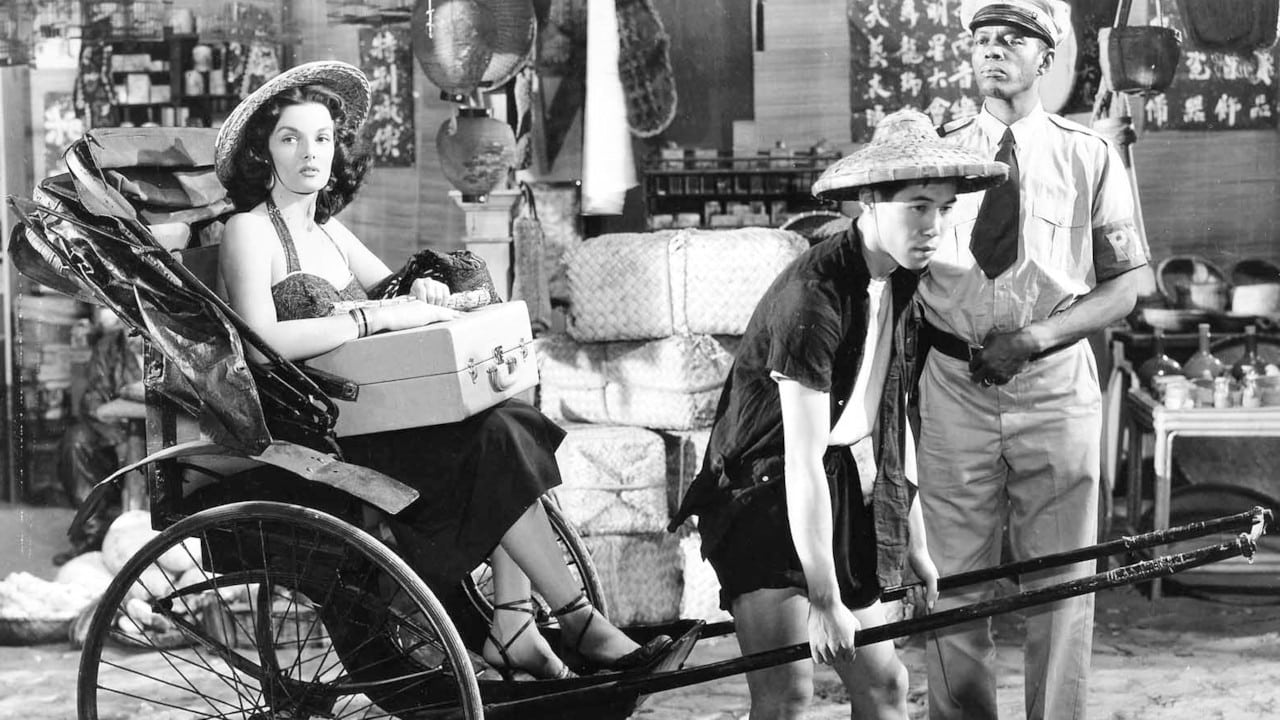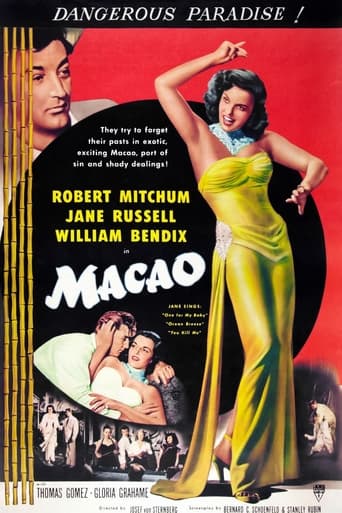Doomtomylo
a film so unique, intoxicating and bizarre that it not only demands another viewing, but is also forgivable as a satirical comedy where the jokes eventually take the back seat.
Kinley
This movie feels like it was made purely to piss off people who want good shows
Janis
One of the most extraordinary films you will see this year. Take that as you want.
bruno-32
I don't know if it was the writers or the acting or both..couldn't't believe the dialogue...and the way it was expressed. This type of movie was better made in the 30's with Marlene Dietrich..Jane Russell is no Marlene Dietrich, that is for sure. Personally, i never could see JR as an actress..no emotion whatsoever. I guess they couldn't't get Rita Hayworth. Its obvious why she made the silver screen, and i think she once admitted it in an interview in her later years..."these two up front". Mitchum was a disappointment like he was embarrassed to be in it. As for the owner of the nightclub...where was Vincent Price? Ugh!!! The only one that seemed to be OK was Bendix.
blanche-2
These RKO noirs sometimes don't make a lot of sense; "Macao" gets a little murky plot-wise, but otherwise, it's an entertaining film with an excellent cast. And as an added bonus, it has Josef von Sternberg at the helm until he was kicked off the movie, and then it has Nicholas Ray. Not bad.Robert Mitchum, sexy and wide-shouldered in one of those loose-fitting tropical suits, plays Nick Cochran, going to Macao to start over after leaving the U.S. and spending time in the service. He originally thought he committed murder, but even though he hadn't, he kept going. On the boat en route to Macao, he meets beautiful, sexy, non-nonsense Julie Benson (Jane Russell) and a salesman (William Bendix).When they arrive, Mitchum is taken for a police detective out to get a criminal/casino owner Halloran (Brad Dexter) back to the states. The chief of police (Thomas Gomez) is in cahoots with Halloran. Plus, Halloran becomes interested in Julie, so he really wants to get rid of Cochran. Criminals in Macao avoid the "three mile limit" - because three miles outside of Macao, international jurisdiction rules.Apparently Mitchum did some rewrites on this script because it didn't make much sense. The cast and crew, all of whom had worked together many times, were a little too friendly for von Sternberg, which caused Mitchum to push all of his buttons. I'm not sure if Ray dragged Gloria Grahame with him or what, but she's wasted here, and she had no interest in this role. Can't blame her.Despite all of this, Mitchum and Russell are great together, a wonderful, sexy combination. Both stars just ooze sex appeal, and Mitchum's laid-back performance is a great juxtaposition to Russell's character - it's pointed out that she has a big chip on her shoulder. Russell looks fabulous in the costumes, an added bonus.Pretty music, excellent noir photography, and a good pace help make "Macao" good entertainment. For me it can't touch "Out of the Past" or "The Big Steal," but you can't beat Mitchum and Russell heating up the screen.
grandpagbm
This is a good film. The dialog sounds like crime movies of the 1940's, but the script is very good. The performances by Robert Mitchum, Jane Russell, and William Bendix are excellent. Russell sings a couple of songs, very well, and is drop-dead gorgeous, in the role of a torch singer. Gloria Grahame has a supporting femme fatale role, similar to many she played in the 1940's and 1950's, and she always did a good job. The movie opens with a documentary-like description of Macao, assuming audiences would not know much, if anything, about the island and its location (which probably was true). It's a good adventure/crime story, done in black-and-white, which works well, since most of the action takes place at night. I will enjoy watching this film often.
RResende
This time my intuition failed. I usually predict somethings about the films i'm about to see based on pure preconceptions, somethings i got from previews viewings of films from the producers/actors/directors i'm about to watch, the title of the film (it usually suggests a lot to me just to know the title) or pure intuition. This was this last case.What we have here is a noir made in the beginning of a decade of interesting aspects for American cinema: it was not experimental as the 30' (which were exploring the possibilities of a renewed medium, which had gained the possibilities of synchronized sound/image) nor as established in a genre and a sense of style as the 40'. So, in a way, it was rather undefined. But films like this one tell me that it was no longer a period for noir as the 40' (and to that matter, John Huston) defined it. The Maltese falcon changed (or maybe summarized) some conventions and introduced new possibilities in film narrative devices, and that legacy went on to be developed and still has new steps being taken today. But that style, the very appreciated hats, detectives, shadow/light which were the more visible face (and to many viewers incorrectly regarded as the essence of noir) don't work here anymore. I'm still trying to find a film noir post Sunset Boulevard that really works. This is not it.Start with Macao. It was in theory a good city to place a story of this kind. Even if the reality described in the introduction of the film is probably a tremendous exaggeration (and invention) over what really happened in Macao those days, that is an exaggeration one is willing to accept, for cinematic richness. A side complaint is the portrayal of the Portuguese policeman. The fat moustache corrupt guy is a preconception i suppose many Europeans had (some may still have it today) regarding the Portuguese. I don't know the ideas American had on this, but this stylizations upsets today, but probably in 20 years from now there preconceptions we see on today's films that will be noted. Anyway, i get in many many American films with more than 30 years a lot of situations like this (the Japanese from Breakfast at Tiffany's comes to my mind right now). Anyway Macao starts as a promise in the voice off, but ends as a dull slightly oriental slightly generic studio set, with no great interest beyond what was described of it.Behind this there was the controlling and charismatic (rich) H.Hughes. He was probably very controlling regarding his productions (he was himself someone who had got into the delicate work of directing). He places two of his fetishes here: Mitchum and Russell. So, we had Hughes, wanting to create a classic noir picture. In order to do that he calls a competent (more than competent) director, who precisely been able to bring out some very competent work in placing stories in strange exotic sceneries; Hughes, knowing that, searches a typical noir scenario, not fresh, not interesting (or at least not interestingly explored). The plot is not even near anything interesting from the previous decade. Is there any doubt somewhere in the plot? What don't we know? Don't we know who is controlling the story? Is there any ambiguity regarding any character? Grahame was the woman in the story who might have brought some ambiguity regarding the "god" in the story, the puppeteer controlling actions on the viewers back, but is totally misused. The scene with Mitchum and Russell in the boat too much near the beginning throws away any ambiguity or game there might occur between both. Mitchum is just about walking around in white suit, portraying his "americanhood". Russell might have been seductive and mysterious to Hughes eyes, but here she was an ordinary woman, fully out passed by Grahame in the much less scenes where she performed. Russell had better moments in films. So this is nostalgic, i had interesting in watching it, but it didn't live up to my expectations.My opinion: 2/5

